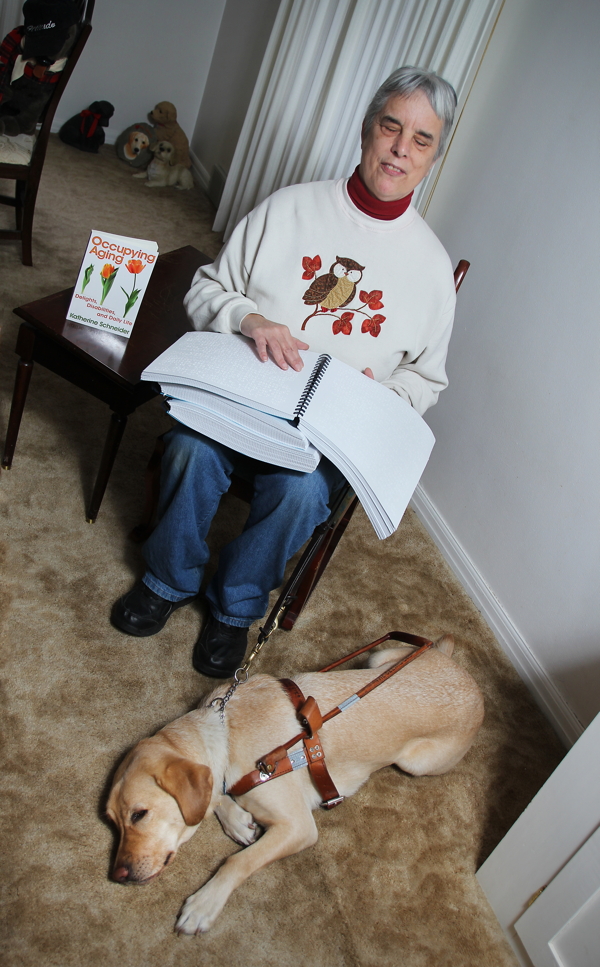Occupying Aging
local author pens journal on aging, disabilities
Tyler Jennings Henderson, photos by Andrea Paulseth |

As someone who has been educating the people of the Chippewa Valley about life with disabilities for years, it’s no surprise that Dr. Katherine Schneider is continuing to pave the way with her third book, Occupying Aging: Delights, Disabilities, and Daily Life, which was published by Dog Ear Publishing in September.
“I wanted to talk about living with disabilities,” she said. “Both the frustrations and the good stuff.”
Schneider, a retired UW-Eau Claire clinical psychologist, wrote a journal of her year in 2012 to highlight both the struggles and the joys of the aging process, especially while also dealing with a disability. She has been blind since birth and has been working with the assistance of Seeing Eye dogs for most of her life.
“Half of people over 65 will develop a disability, and these are people who haven’t had a disability before,” Schneider explained. “And it really throws a lot of people off their game.
“I figured that somebody who has been around the block a few times with a disability should say, ‘Here’s how it is, here are some tricks of the trade.’ ”
After thinking about writing a list of tips, she instead chose the journal-style approach. “Some days are disability-related, other days are squirrel appreciation day,” she laughed. “It’s whatever is going on that day.”
Schneider’s previous two books have very different styles. Her first was a memoir entitled To the Left of Inspiration: Adventures in Living with Disabilities, while her second was a children’s picture book called, Your Treasure Hunt: Disabilities and Finding Your Gold. All of her books have been self-published with the memoir eventually turning a profit, but Schneider isn’t concerned with making money on her writings.
“I wrote (the children’s book) because kids need to understand living with disability,” she said. “It will make life better for kids, and if I lose money on it, so be it.”
The same is true for Occupying Aging as she tries to deliver a message of patience and acceptance to those who are struggling with the inevitability of getting older.
“They need to learn new techniques to cope,” she said. “And once they do, they need to know how to work things so that they can get back to their lives. Just because someone has a disability, doesn’t mean ‘the end,’ it means ‘Let’s do it!’ ”
The publication is available to people with a wide range of disabilities, something that is extremely important to Schneider, who doesn’t like exclusion based on ability. “It’s just not right,” she said. As if to prove her point, Schneider picked up the sizeable braille version of her book. That edition has 200 more pages than the worded book, allowing blind individuals, herself included, to read the inspiring journal entries.
“The advantage (to reading braille was) when I was young (was) I could always read books in bed and never get caught,” she laughed. “I learned to read bumps in first grade, others learned how to read squiggles.”
That attitude of inclusive opportunity and positive thinking is what Schneider hopes to instill in her readers, as she said, “There are delights in aging, whether one has disabilities or not.”
“The reason I called it Occupying Aging is because being old, well, you don’t have any choice in that,” she said. “But how are you going to do it? If you decide that you are going to occupy that space in your own way, then it can be kind of fun.”
The cover of the book describes the book’s meaning better than anything, Schneider said. She decided on a tulip design that now graces the published version, but the original tulip design was not what she wanted.
“One was just a bud, one was full bloom, and one was a week later so it was half-dead and slimy,” she said. “I was furious about that; I had no idea what they were thinking!”
After she “cooled down a bit,” she decided that someone must have seen the word “aging” in the title and pictured the dying tulip as part of that process. With that in mind, she gave the designer one change to the cover that would end up being the mantra of the entire book.
“The third one needs to be full bloom,” she said. “Because when we are aging, we are in full bloom.”
Occupying Aging is available at the UW-Eau Claire Bookstore in the Davies Center and The Local Store, 205 N. Dewey St.


















